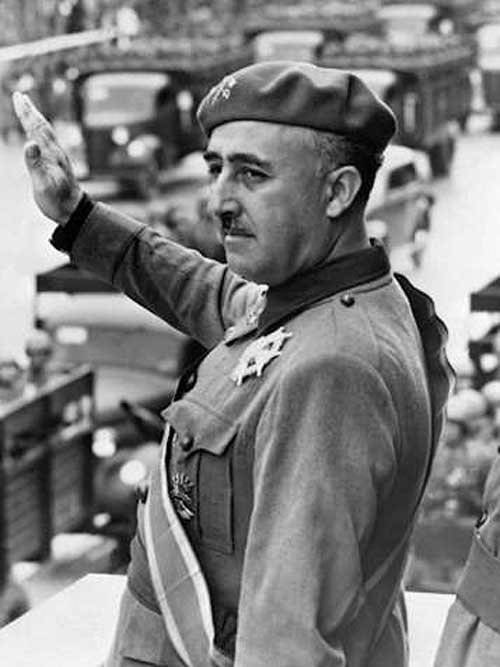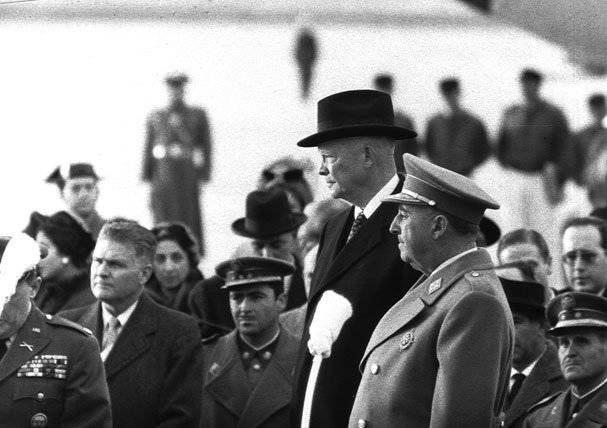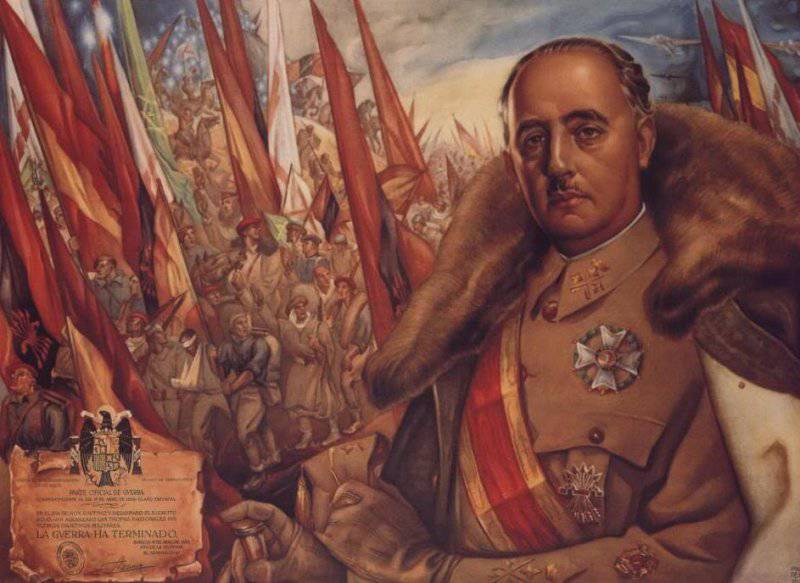Generalissimo Francisco Franco - Dictator of Spain, Regent and Caudillo (Leader)
In March 1939, the Spanish Civil War ended. The last Republicans went through the Pyrenean passes to France.
The new power in Spain was personified by General Franco - he was given the rank of generalissimo later. His position and position were determined by the title "caudillo" - "leader."
By the beginning of the Spanish Civil War, General Francisco Franco Baamonde-i-Salgado-Araujo turned 44.
The leader looked older than his years. He had an unpresentable exterior - short (157 cm), short-legged, full-bodied, with a thin piercing voice and awkward gestures. German friends from among the "blond connoisseurs" looked at Franco with amazement: Semitic features clearly appeared in the person of the Generalissimo. There were enough grounds: the Arabs dominated the Iberian Peninsula for centuries, the number of Jews in the Cordoba caliphate reached one eighth of the population ... Besides Franco was not "Castillo" - he was born in Galicia, inhabited by the Portuguese.
The ominously romantic Soviet version of the beginning of the Spanish nationalist uprising is a lie. The phrase "Above all of Spain the sky is clear" (option: cloudless) did not serve as a conditional signal. She 18 July 1936 g. Ended the usual morning weather forecast - that was the signal.
The uprising of the Spanish right against the republican government was largely provoked by the Republicans themselves.
The government of the Popular Front was a colorful gathering of leftists, leftists and leftists of all shades - from social democrats and socialists to trotskyists and anarchists. Left bias became steeper. Anarchy, guerrilla and economic chaos pushed the country into complete collapse. The political repressions of the Leninist-Stalinist type were becoming more and more widespread. Instead of bread and work, people were offered decrees and slogans. The left regime was hanging on the neck of a Spanish peasant who was forced to push a crowd of leaders, agitators and talkers for nothing, because the Republicans had banned free trade.
The political pendulum from the extreme left position inevitably sought to the far right. The center of forces, the point of harmonization of interests, did not appear in the country. The Catholic Church enjoyed great prestige; Republicans did not dare to de-Christianize, but they acquired a blood enemy in the church, and among the masses of believers there were hidden enemies.
The right forces also did not shine with merits. In the camp of the supporters of Franco dominated the dense obscurantism and political retrograde.
The landowning aristocracy and the noblemans, who were considerably straggling around, were sticking out their chests and puffed out their cheeks without any particular reason — they could not even properly finance the uprising that had begun. It is not surprising that the nationalists immediately requested assistance from Germany and Italy, and the basis of their armed forces consisted of mobilized peasants and Arab-Berber arrows from Morocco.

Republicans on their territory bourgeois spared not. But the nationalists are not much inferior to them. The slogan of the rebels sounded peculiar - "The people, the monarchy, faith." That is, he had little in common with the slogans of the Italian "Fashio di Combatimento" and the German "National Socialists."
Mussolini, the ideologue of the corporate state, was indifferent to the church and despised the monarchy. Hitler was a militant anti-Christian and anti-Semite. With Franco, these leaders converged only in nationalism. But Franco's nationalism was "international" - he considered all citizens of the country without racial and tribal differences as Spaniards. The ideological basis of the Franco regime was Catholicism, and politically it was going to restore the monarchy.
Becoming the head of the country, Franco was in a difficult position. Save power and pull Spain out of the quagmire, he could only desperately tacking. What started to do.
Franco understood: with friends such as Hitler and Mussolini, he would inevitably be drawn into a world war. If Hitler wins - Spain will not win anything, if Hitler loses - Spain will cease to be.
Franco declared neutrality. He made gestures in the direction of Hitler to keep his friend at a decent distance. He allowed the ships and submarines of the German Navy to bunk in Spanish ports, supply them with tobacco, oranges and fresh water. Received from Argentina ships with grain and meat for Germany, passed these goods through Spanish territory. When the war with Russia began, he sent one division there, but did not subordinate it to the command of the Wehrmacht. German troops on the territory of Spain did not allow to enter. He spoke very respectfully of Churchill and maintained diplomatic relations with England. With restraint, without emotion, he spoke of Stalin.
Under Franco, in Spain there was not only the genocide of the Jews, but also restrictive measures against them.
When the war ended, the forces of the anti-Hitler coalition did not enter Spain - there was not even a formal reason for this. Few of the surviving military and officials who lost the war to the Axis countries and managed to get to Spain, Franco quickly drove to Latin America.
The situation of the country remains difficult. Spain was denied help according to the Marshall Plan, NATO was not accepted, the UN was not allowed until 1955 as a country with an authoritarian-dictatorial regime.
In 1947, Franco declared Spain a monarchy with a vacant throne and proclaimed the principle of autarky (self-reliance).
Vacant throne was someone to take. Dynasty is not stopped. Juan Carlos, the grandson of King Alfonso XIII deposed in 1931, lived and was in good health, although at the time he was still a nine-year-old child.
He educated the future monarch caudillo himself, without entrusting this important matter to anyone. He talked with the young prince, followed his teachings, read books to him, attended church services with him, instructed him to be the head of the nation. At the same time, Franco frankly made it clear to Juan Carlos that he would not have to announce his enthronement upon reaching the age of majority. The leader reasonably adhered to the principle of Moses - to lead the people in the desert for forty years until the past life is forgotten; he understood that the young king simply could not cope with the ossified legacy, he could easily become a toy in the hands of the old Testament schemers and military adventurers.
King Juan Carlos later recalled how surprising his attitude to religion and church was Franco. In observance of external piety, the Generalissimo was punctual, but internally special religious zeal was no different. A professional military man, he perceived faith as a disciplining factor and one of the means of politics, but no more. In particular, he categorically objected to the increase in the number of monasticism, demanded from the clergy first of all social, worldly activities.
Franco's regime was clearly conservative and patriotic. He ruled by military-oligarchic methods. He censored the press, severely suppressed the political opposition and national separatists, banned all parties and trade unions (except Soviet-style "vertical" trade unions), did not stop using the death penalty for clandestine activities, did not allow prisons to be empty. Curiously: the severity of the repressions in Spain softened noticeably after the death of Stalin ...
To his own party, the Spanish phalanx, in the middle of the 1950-ies. renamed the National Movement and which became something of a “union of associates” under the leader, Franco was skeptical. The Catholic congregation "Opus Dei" ("God's Work") was the surrogate party in the country. At the beginning of 1960, Franco drove all Phalangists out of the government altogether. A little earlier, in spite of the resistance of the party members, he sharply reduced the number of officers and the general's corps. The non-productive class in Spain has grown so much that there were two generals for one army regiment.
Officially, the Generalissimo pursued a line of general reconciliation and automatic amnesty to all who declared their loyalty. In the Valley of the Fallen near Madrid, on the orders of Franco, a grandiose memorial with a fraternal cemetery to the victims of the civil war of both sides was erected. The monument to the fallen is very simple and impressive - this is a huge Catholic cross.
The isolation and autarky principle helped Spain to survive, but did not contribute to economic growth. Only at the end of 1950-x Franco allowed foreign capital into the country and allowed to create joint ventures. Gradually got rid of all the Spanish colonies, the sense of which was not, but the threat of colonial wars hung constantly.

However, before the start of the 1960's. Spain remained one of the poorest countries in Western Europe. Ten years later, it became clear that the Franco regime had exhausted itself. The Generalissimo stopped the confusion in the country with iron and blood, crushed the opposition, secured sovereignty - but the "Spanish social world" was like the peace of a poor monastic school. The country's population approached 40 to millions of people, but the economy did not develop, unemployment grew, there was a "stagnation in poverty." The mass labor migration of Spaniards, mainly to France, and the development of foreign tourism could not feed the country. The post-war generation of young Spaniards was without particular respect for the conservative-religious values of the caudillo regime.
In 1975, after having stayed in power for 36 years (and not having reached the “Moisey term” for a while), Generalissimo Franco died. The legal heir, the current king Juan Carlos, ascended to the vacant throne. For six years, the country was swayed by the jolts of intoxication with freedom, political parties bred like flies. In February, 1981, the dashing Colonel Tehero Molina, broke into parliament, bummed a gun at the ceiling and tried to make a coup - but after two hours, sour and gave up. In 1982, the socialist party Felipe Gonzalez won the general election. The country seemed to have returned to the 1936 year - but inside and outside it, everything was different.
The Spaniards consider the era of Franco's rule not the worst time in stories Spain. Especially in the light of the chronic and incessant socio-economic crises and cataclysms constantly occurring in recent decades. The name of the generalissimo in Spain has not been deleted.

Information